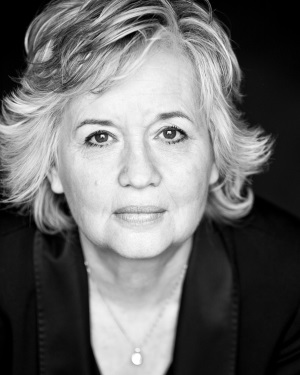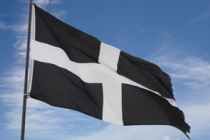Susan Penhaligon – stage, TV and movie actress, author, proudly and outspokenly Cornish

Susan Penhaligon was born on 3 July 1949 and is a Cornish actress probably best known for her appearances in the controversial 1976 drama Bouquet of Barbed Wire and for playing Judi Dench's sister in the 1981 sitcom A Fine Romance. She also played a British military officer in Paul Verhoeven's Soldier of Orange.
Although born in Manila, both her parents were Cornish and there can be little doubt of her being Cornish with a fine Cornish surname like Penhaligon! She returned with her family to Cornwall, aged 6. She spent her formative years living in St. Ives and Falmouth.
Aged 11 she was sent to boarding school in Bristol where her acting ambitions were encouraged. She has two brothers and a sister in the U.S.A. After her parents divorced, her father went to live in San Francisco and worked as a private detective.
She is a cousin of the late David Penhaligon MP, a former Liberal member of parliament in Cornwall.
While training at the Webber Douglas Academy of Dramatic Art,Penhaligon shared a flat with soon-to-be rock star Peter Hammill. Tagged the 'British Bardot' in the 1970s, Clive Aslet in The Daily Telegraph wrote that Penhaligon ‘was the face of the decade’.
Susan Penhaligon's first appearance in the theatre was playing Juliet in Romeo and Juliet at the Connaught Theatre Worthing in a two weekly repertory company.
In the West End she appeared in a 1987 production of Three Sisters at the Albery Theatre.In 1982, she played a leading part in The Real Thing at the Strand Theatre, Aldwich (now called the Novello). She appeared in The Maintenance Man at the Comedy Theatre in 1987, and played "Curley’s Wife" in a 1984 production of Of Mice and Men at the now defunct Mermaid Theatre. She has toured the UK extensively, appearing in productions of The Constant Wife (Richmond Theatre, 2004), Mrs. Warren's Profession (Richmond Theatre, 2009), Death Trap (Theatre Royal, Norwich, 2002), Agatha Christie's Verdict (Floral Pavilion Theatre, 2011), Dangerous Obsession with Simon Ward (Theatre Royal, Bath, 1989), and Lord Arthur Saville's Crime by Oscar Wilde (Richmond Theatre, 2005).
She was in Time and the Conways, Lower Depths and The Cherry Orchard, and played a leading part in Arthur Miller's Broken Glass at WYP in Leeds.
In the Edinburgh Festival Fringe she appeared in the premiere of Dario Fo's Abduction Diana and she appeared in a critically acclaimed production of Misery at The King's Head Theatre.
Her TV credits include Count Dracula (1977) with Louis Jourdan, Upstairs Downstairs, Tales of the Unexpected, Bergerac, Remington, Wycliffe, Doctor Who, The Taming of the Shrew by the BBC Shakespeare series, Country and A Kind of Loving. In A Fine Romance, she played Judi Dench's sister Helen. She has been in three different episodes of Doctors and three different episodes of Casualty. She also played Jean Hope in UK soap Emmerdale, for a year.
Susan Penhaligon had roles in films such as Say Hello to Yesterday (1970), Private Road (1971), Under Milk Wood (1972) as Mae Rose Cottage, No Sex Please, We're British (1973), The Land That Time Forgot (1975), House of Mortal Sin(1976), Nasty Habits (1977), Paul Verhoeven's Soldier of Orange (1977) as a British military officer, The Uncanny (1977),Leopard in the Snow (1978), Patrick (1978), The Masks of Death (1984), and Top Dog (2014). She also played the role of the sole survivor of LANSA Flight 508, Juliane Koepcke in the film Miracles Still Happen (1974), directed by Giuseppe Maria Scotese.
Her novel For the Love of Angel, published in 2008 by Truran Books, is set in Cornwall in the 1880s
Susan declares herself proudly a Cornishwoman and has said, ‘That is where I get my sense of roots; of being Cornish. I had a very old fashioned Cornish granny who made saffron cake and pasties’.
Her grandmother imbued her with a sense of being Cornish. ‘She took it upon herself to teach us about Cornwall: this is what the Cornish do, what they think.’
Penhaligon’s Cornish roots run deep – and all the way back to the 18th century.
‘My great, great, great-grandfather worked in the St Austell clay pits. I am completely Cornish on both sides of the family’.
But she doesn’t visit as much as she’d like to. ‘I’ve turned into a bit of an ex-pat. I sit here in London and comment without really knowing much about it. But Cornwall has changed so much – especially St. Ives…adding ‘don’t get me started on that…’ ‘I can’t believe there is not even one Cornish person on the Town Parish Council down there. Unbelievable! I cannot believe they have allowed so many houses to become holiday lets and second homes.’
‘For me, the sense of community that existed while I was growing up is no longer there.’
“No! I’m not saying change shouldn’t happen, and I’m not saying that people shouldn’t earn a living. My mother ran a B&B, so I know how important the holiday season is, but I think you have to strike a balance. You have to retain the community as well. That is very important.’
But acting was not the reason she recently made the newspapers. Although not fiercely political she does have a ‘healthy interest in politics’ and feels her chosen party is moving too far to the centre for her liking. ‘I can’t get my head around privatising the Royal Mail,’ she stated, and she was so angered by the Lib-Dems backing of the controversial ‘Bedroom Tax’, she ripped up her Lib-Dem membership card in protest. Her late cousin, Liberal MP David Penhaligon, once tipped as a future party leader before he was tragically killed in a car crash in 1986, would surely be ‘turning in his grave’ over such controversial policies. ‘If I lived in Cornwall, I think I might be in Mebyon Kernow!’
And if she lived in Cornwall she would be pressing the powers-that-be to create one big art festival. ‘Like something along the lines of the Edinburgh Festival’. She visualises it being held in Truro and other large towns like Falmouth or Launceston. ‘Edinburgh makes a fortune when the festival is on, tourists come from all over the world. Cornwall should be promoting the Arts not just pasties and saffron cake. There is so much talent down there.’
But what about funding? ‘Of course, funding would be difficult but maybe Prince Charles would help. He is the Duke of Cornwall and he is very much for the arts.’ Yet she insisted she is not the person to kick start the idea. ‘I’m not a ‘committee’ kind of person,’ she says, despite her obvious passion for the idea.
‘What we need is a Cornwall Arts Festival,’ she repeated, ‘taking in all the arts: music, TV, theatre, films, art, writing, books…everything! Can you imagine the revenue it would generate for the country! And it would be exciting, and would bring a different kind of tourist to Kernow.’
This article has been kindly provided by Kernow Matters to Us and is the fourteenth in a series on Famous Folk of Kernow (Cornwall).
- Cornish
- English
- Log in to post comments





